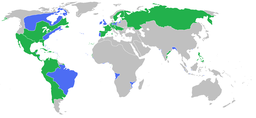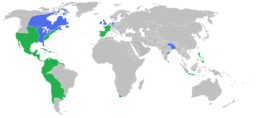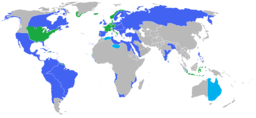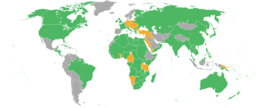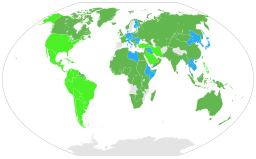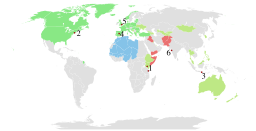World war

| Part of a series on |
| War |
|---|
A world war is an international
Etymology
The German writer August Wilhelm Otto Niemann used the term "world war" in the title of his anti-British novel, Der Weltkrieg: Deutsche Träume (The World War: German Dreams) in 1904, published in English as The Coming Conquest of England.
The term "first world war" was first used in September 1914 by German biologist and philosopher Ernst Haeckel, who claimed that "there is no doubt that the course and character of the feared 'European War' ... will become the first world war in the full sense of the word",[4] citing a wire service report in the Indianapolis Star on 20 September 1914. In English, the term "First World War" had been used by Lt-Col. Charles à Court Repington, as a title for his memoirs (published in 1920); he had noted his discussion on the matter with a Major Johnstone of Harvard University in his diary entry of September 10, 1918.[5][6]
The term "World War I" was coined by Time magazine on page 28 of its June 12, 1939 issue. In the same article, on page 32, the term "World War II" was first used speculatively to describe the upcoming war. The first use for the actual war came in its issue of September 11, 1939.[7] One week earlier, on September 4, the day after France and the United Kingdom declared war on Germany, the Danish newspaper Kristeligt Dagblad used the term on its front page, saying "The Second World War broke out yesterday at 11 a.m."[8]
Other languages have also adopted the "world war" terminology; for example, in French, "world war" is translated as guerre mondiale; in German, Weltkrieg (which, prior to the war, had been used in the more abstract meaning of a global conflict); in Italian, guerra mondiale; in Spanish and Portuguese, guerra mundial; in Danish and Norwegian, verdenskrig; in Russian, мировая война (mirovaya voyna); and in Finnish, maailmansota.
History
First World War
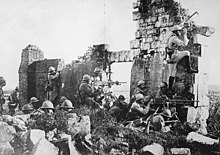
World War I occurred from 1914 to 1918. In terms of human
Second World War
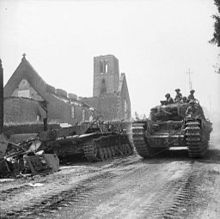
The Second World War occurred from 1939 to 1945 and is the only conflict in which
The outcome of the war had a profound effect on the course of world history. The old European empires collapsed or they were dismantled as a direct result of the crushing costs of the war and in some cases, their fall was caused by the defeat of imperial powers. The United States became firmly established as the dominant global superpower, along with its close competitor and ideological foe, the Soviet Union. The two superpowers exerted political influence over most of the world's nation-states for decades after the end of the Second World War. The modern international security, economic, and diplomatic system was created in the aftermath of the war.[10]
Institutions such as the
Potential Third World War

Since the atomic bombings of Hiroshima and Nagasaki during the Second World War, there has been a widespread and prolonged fear of a potential third world war between nuclear-armed powers.[11][12] It is often suggested that it would become a nuclear war, and be more devastating and violent than both the First and Second World Wars. Albert Einstein is often quoted as having said in 1947 that "I know not with what weapons World War III will be fought, but World War IV will be fought with sticks and stones."[13][14][15][16] It has been anticipated and planned for by military and civil authorities, and it has also been explored in fiction in many countries. Scenarios have ranged from conventional warfare to limited or total nuclear warfare.[citation needed]
Various former government officials, politicians, authors, and military leaders (including
During the early 21st century, the
Other global conflicts
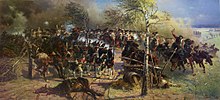
The Seven Years' War (1754/56–1763) was fought across all of North America, Europe, Asia, Africa, and South America. Most of the great powers of the era participated, notably including the British Empire and French Empire, but polities from many continents played important roles. Some historians call it "World War Zero" as a result.[25]
Historians Richard F. Hamilton and
Other historians suggest even earlier conflicts to be world wars. For example, Russian ethnologist
However, the
Another possible example is the
See also
- Neocolonialism
- New Imperialism
- Revolutionary wave
- List of largest empires
- First wave of European colonization
- List of military conflicts spanning multiple wars
- List of wars and anthropogenic disasters by death toll
- Military history
- Political history of the world
References
- ^ "World War". Merriam-Webster. Archived from the original on 11 December 2019. Retrieved 11 November 2019.
- ^ Engels, Frederick. "Introduction to Borkheim". Archived from the original on 2018-07-16. Retrieved 2015-03-01.
- OCLC 626839.
- ^ Shapiro & Epstein 2006, p. 329.
- ^ Proffitt, Michael (2014-06-13). "Chief Editor's notes June 2014". Oxford English Dictionary's blog. Archived from the original on 2022-04-15. Retrieved 2022-04-25.
- ^ "The First World War". Quite Interesting. Archived from the original on 2014-01-03. Also aired on QI Series I Episode 2, 16 September 2011, BBC Two.
- ^ "Grey Friday: TIME Reports on World War II Beginning". TIME. September 11, 1939. Archived from the original on 11 October 2014. Retrieved 20 October 2014.
World War II began last week at 5:20 a. m. (Polish time) Friday, September 1, when a German bombing plane dropped a projectile on Puck, fishing village and airbase in the armpit of the Hel Peninsula.
- ^ "Den anden Verdenskrig udbrød i Gaar Middags Kl. 11", Kristeligt Dagblad, September 4, 1939, Extra edition.
- ^ "Documenting Numbers of Victims of the Holocaust and Nazi Persecution". encyclopedia.ushmm.org. Archived from the original on 2020-02-20. Retrieved 2020-09-05.
- ^ a b c "World War". Archived from the original on 11 November 2019. Retrieved 11 November 2019.
- ISBN 0-7593-3869-8.
- ISBN 1-4051-3902-1.
- ISBN 978-0-691-12075-1.
- ^ "The culture of Einstein". NBC News. 2005-04-19. Archived from the original on 2013-10-05. Retrieved 2012-08-24.
- ^ "24 Jun 1948, Page 4 - The Berkshire Eagle at Newspapers.com". Newspapers.com. Archived from the original on 2022-04-22. Retrieved 2022-04-22.
- ^ "Did Albert Einstein Say World War IV Will be Fought 'With Sticks and Stones'?". Snopes.com. 16 April 2018. Archived from the original on 2022-04-22. Retrieved 2022-04-22.
- ISBN 0688092187.Book regarding alleged WWIV
- ^ "World War IV: Let's call this conflict what it is". 2001. Archived from the original on 2010-03-27. Retrieved 2010-02-04.Why war on terrorism should be called WWIV
- ^ Subcomandante Marcos (2001). "The Fourth World War Has Begun". Nepantla: Views from South. 2 (3): 559–572. Archived from the original on 29 October 2014. Retrieved 20 October 2014.
- ^ Anne Barnard and Karen Shoumali (12 October 2015). "U.S. Weaponry Is Turning Syria Into Proxy War With Russia". The New York Times. Archived from the original on 15 October 2015. Retrieved 14 October 2015.
- ^ Martin Pengelly (4 October 2015). "John McCain says US is engaged in proxy war with Russia in Syria". The Guardian. Archived from the original on 12 October 2015. Retrieved 17 October 2015.
- ^ Holly Yan and Mark Morgenstein (13 October 2015). "U.S., Russia escalate involvement in Syria". CNN. Archived from the original on 17 October 2015. Retrieved 17 October 2015.
- ^ Taub, Amanda (1 October 2015). ""The Russians have made a serious mistake": how Putin's Syria gambit will backfire". Vox. Archived from the original on 22 October 2015. Retrieved 17 October 2015.
- ^ "Untangling the Overlapping Conflicts in the Syrian War". The New York Times. 18 October 2015. Archived from the original on 19 October 2015. Retrieved 19 October 2015.
- ^ "Why the first world war wasn't really". The Economist. 2014-07-01. Archived from the original on 2018-05-30. Retrieved 2018-05-29.
- ^ ISBN 978-1-107-39386-8. Archivedfrom the original on 21 January 2022. Retrieved 21 January 2022.
- ^ OCLC 1061862132. Archivedfrom the original on 21 January 2022. Retrieved 21 January 2022.
- ISBN 978-5-8112-3742-5
- ^ Crowley, Roger Empires of the Sea: The siege of Malta, the battle of Lepanto and the contest for the center of the world, Random House, 2008
- ^ "The Ottoman 'Discovery' of the Indian Ocean in the Sixteenth Century: The Age of Exploration from an Islamic Perspective | History Cooperative". 2021-08-22. Retrieved 2023-05-04.
- ^ "Trettioåriga kriget". Historiska Media (in Swedish). Retrieved 2023-03-27.
- ^ Written by Felix Velazquez Lopez. With the collaboration of several academics from universities in Spain. Produced by Premium Cinema. (2010). «The History of the Greatest Empire Ever Known: Chapter 5, Felipe III (Los Austrias)».
- ISBN 978-1-5267-7575-7.
- ^ "Globalizing the Thirty Years War: Early German Newspapers and their Geopolitical Perspective on the Atlantic World". Retrieved 2023-04-04.
- ISBN 9780195374209. Retrieved 20 October 2014.
- OCLC 1166971747. Archivedfrom the original on 2022-01-21. Retrieved 2022-01-21.
- ^ ISBN 978-1-4516-2411-3. Archivedfrom the original on 21 January 2022. Retrieved 21 January 2022.
- OCLC 1232140043. Archivedfrom the original on 21 January 2022. Retrieved 21 January 2022.
- ^ Urlanis, Boris Cezarevič (1971). Wars and Population. Progress Publishing. p. 187.
- ISBN 978-0813163659.
- ISBN 978-1-317-89951-8. Archivedfrom the original on 21 January 2022. Retrieved 21 January 2022.
- ^ a b "WW1: Was it really the first world war?". BBC News. 28 June 2014. Archived from the original on 20 January 2022. Retrieved 20 January 2022.
- from the original on 2018-06-01. Retrieved 2022-01-20.
- ISBN 978-0-393-08192-3.
- ^ "1812: The First World War". Age of Revolution. Archived from the original on 20 January 2022. Retrieved 20 January 2022.
- ^ Charles Esdaile "Napoleon's Wars: An International History".
- ^ Willmott 2003, p. 307
- ^ "Emerging Infectious Diseases journal – CDC". www.cdc.gov. Archived from the original on 2009-10-06. Retrieved 2017-09-18.
- ISBN 978-0-316-92056-8.
- ^ Fink, George: Stress of War, Conflict and Disaster
- ^ a b
- "Human Cost of Post-9/11 Wars: Direct War Deaths in Major War Zones, Afghanistan & Pakistan (Oct. 2001 – Aug. 2021); Iraq (March 2003 – Aug. 2021); Syria (Sept. 2014 – May 2021); Yemen (Oct. 2002–Aug. 2021) and Other Post-9/11 War Zones". The Costs of War. Retrieved 10 September 2021.
- Berger, Miriam (15 May 2023). "Post-9/11 wars have contributed to some 4.5 million deaths, report suggests". The Washington Post. Archived from the original on 29 May 2023.
- Savell, Stephanie (15 May 2023). "How Death Outlives War: The Reverberating Impact of the Post-9/11 Wars on Human Health" (PDF). Costs of War. Watson Institute of International & Public Affairs. Archived from the original (PDF) on 9 June 2023.
Bibliography
- Shapiro, Fred R.; Epstein, Joseph (2006). The Yale Book of Quotations. Yale University Press. ISBN 978-0-300-10798-2.
- Willmott, H.P. (2003). World War I. Dorling Kindersley. OCLC 52541937.
External links
- This is the Fourth World War, an interview with philosopher Jean Baudrillard




